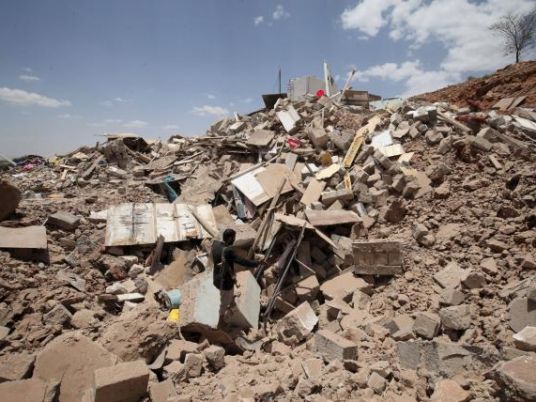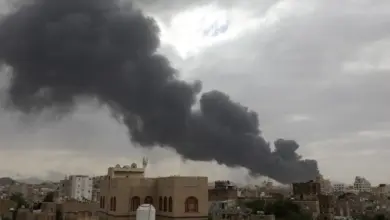
Aircraft from a Saudi-led coalition bombed Yemen's Houthi outposts throughout the country on Sunday, residents said, while Yemen's government in exile said the militia was in talks with the United States in Oman.
The raids hit an air base near Sanaa airport and a military installation aligned with the Houthis overlooking the presidential palace compound in the capital Sanaa.
The Saudi-led coalition began air strikes in Yemen in March in a campaign to restore Yemeni President Abd-Rabbu Mansour Hadi to power. He fled in March, after Iranian-backed Houthis seized Sanaa in September and then thrust into central and south Yemen.
Nearly 2,000 people have been killed and over 8,000 wounded in the conflict since March 19, according to the United Nations.
The Houthis' TV channel al-Masira said the coalition had launched 25 air strikes on the main Houthi provinces of Saada and Hajja along the kingdom's border, without giving details, and said Saudi ground forces were also shelling the areas.
Residents in Saada confirmed to Reuters by telephone that Houthi positions were heavily bombed by war planes, but there was no immediate confirmation by Saudi authorities.
In the central city of Taiz, also a main battleground between armed Hadi loyalists and Houthi militiamen, residents reported Arab air strikes on Houthi forces gathered in a historic mountaintop fortress and a nearby special forces base.
Oman talks
Yemen's exiled government in Saudi Arabia told Reuters on Sunday that senior Houthi officials are holding talks with the United States in neighboring Oman to help end the nine-week conflict, in a sign that diplomacy may be advancing.
"We have been informed that there are meetings, at American request, and that a private American plane carried the Houthis to Muscat," Rajeh Badi, a spokesman for the Hadi government told Reuters by telephone from the Saudi capital Riyadh.
The Yemeni government was not party to the talks, Badi said. There was no immediate comment from Houthi or US officials.
If confirmed, the Oman meeting would be the first between the Houthis and the United States, Saudi Arabia's main foreign ally, since the start of the war.
The United States has said it was providing arms and intelligence to Saudi Arabia during its campaign in Yemen and has historically been its most powerful ally.
"We hope that these talks are being held in the context of international efforts to implement UN Security Council resolution 2216," Badi said.
The resolution, adopted in April, recognized Hadi as Yemen's legitimate authority and called on the Houthis to quit the main cities.
UN Special envoy to Yemen, Ismail Ould Cheikh Ahmed, has renewed efforts to set another date for Yemeni political factions to meet in Geneva for peace talks, which were postponed indefinitely after Hadi demanded delays.
Houthi spokesman Mohammed Abdul-Salam announced on May 23 that he had departed with an official delegation from the group to neighboring Oman to discuss the conflict with the Omani government, a frequent peacebroker in the region.
Yemeni politicians who met Ould Cheikh Ahmed in Sanaa on Saturday said he had informed them that "indirect talks" were underway in Muscat between the Houthi delegation and US officials through Omani mediation.
Officials from the UN envoy's team were not immediately available to comment.
Cluster bombs
Heavy artillery clashes along Yemen's border with the kingdom have increased as the war enters its ninth week.
Houthi TV reported that the rebels fired 20 rockets at Saudi Arabia's southwestern border city of Najran on Saturday, and broadcast a video it said showed Houthi forces shelling a Saudi border post.
A Saudi Interior Ministry spokesman said a border guard was killed and seven others were wounded on Saturday in the Najran region by rocket attacks from inside Yemen.
The coalition's campaign aimed to neutralize "the threats posed by heavy weapons in the hands of elements not backing the legitimate authority in Yemen," Foreign Minister Sameh Shokry of Egypt, a member of the Saudi-led coalition, told reporters alongside his Saudi counterpart in the capital Cairo on Sunday.
Saudi Arabia had claimed success last month in removing the threat of heavy weapons to the kingdom and its neighbors, but the air war and border clashes have persisted.
Human Rights Watch said in a report on Sunday that three bombings it had investigated in the northern province of Saada used cluster bombs, which are banned by most countries, adding that it suspected the munitions were fired by Saudi-led forces.
Two of the alleged attacks in April wounded at least six Yemenis, including a 10-year old boy, but another incident on May 23 did not cause any casualties, it said.
"These weapons can't distinguish military targets from civilians, and their unexploded submunitions threaten civilians, especially children, even long after the fighting," said Ole Solvang, senior researcher at Human Rights Watch.
Saudi officials did not provide an immediate response to the report.



